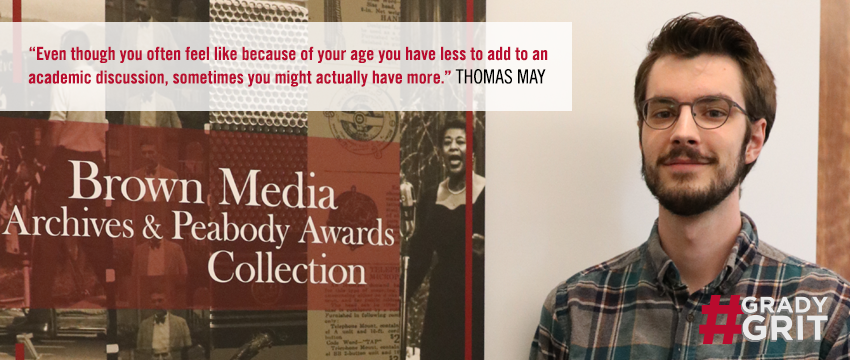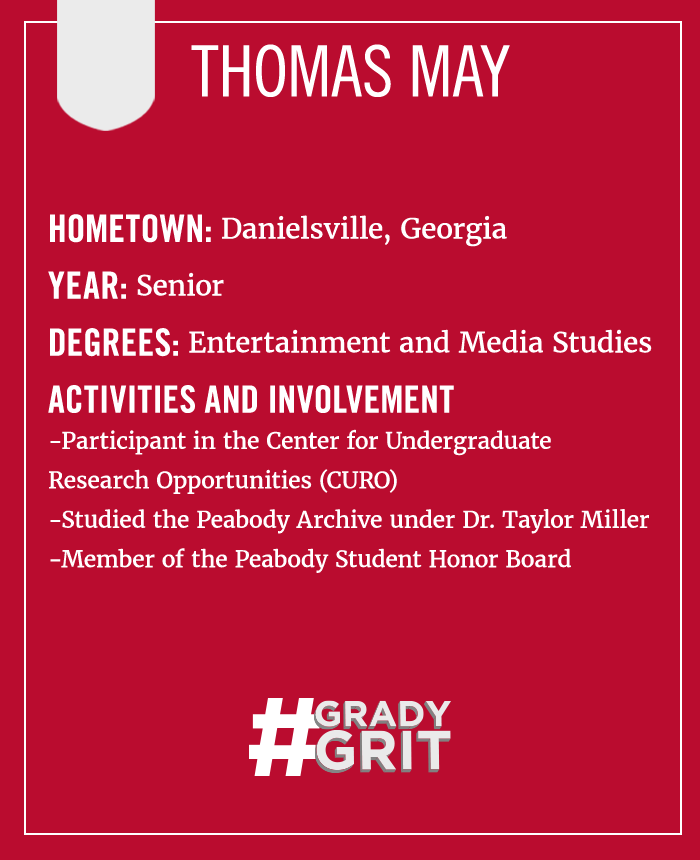#GradyGrit: Meet Thomas May

#GradyGrit: Meet Thomas May
What made you choose EMST as your major?
I’ve always wanted to end up in a writer’s room for TV, so when I transferred to UGA, I knew that I would apply for admission into Grady, and furthermore, into EMST. I remember being really excited that Grady actually had a program dedicated to that type of storytelling because it seems to be a bit of a rarity, even though it’s growing everyday.
What are your career aspirations with your Grady major?
Writing for television or working in television development. I think being on either side of the table would provide for some really interesting and fulfilling opportunities to tell the types of stories you want to tell. But honestly, more bluntly and simply, just to make a career out of telling stories that people want to hear, whatever the format and whatever the platform.
What has been the best advice you’ve received or learned from a Grady teacher or class?
3210 with Biddle will definitely have a lasting impact on me. I don’t know if I’ll ever direct again, but I wanted to put myself outside my comfort zone and try it, and I’m really glad that I did. I’m not a very authoritative person, or really even very talkative, so there were a lot of times where I had to sort of go beyond my nature for the final product. But my crew was awesome and invaluable, and Biddle’s advice never fails to pull you towards something better. It was one of those really tough things that makes you feel like you can do anything you set your mind to the second you’re done with it.
How do you think Grady majors stand out on campus?
I think everyone in Grady has worked really hard to get where they are, and they know it, so there’s a certain amount of confidence that I think people notice. On top of that, there’s a lot of passion in Grady. Everybody really wants to be here and cares about the stories they’re telling and the work they’re doing. Also, though this one might be pretty obvious, the communication of ideas really does stand out. We all know how to get across what we’re trying to say.
What did you study during CURO and why?
I studied the Peabody Archive under the direction of Dr. Taylor Miller. Our catalyst was finding and curating a list of really cool or unique programming that we have in the archive, and the research sort of evolved into building a foundation for future research. Once we had found our programs and paper artifacts, we started to build topical concentrations around those as examples for the type of research that could be done using the archive. There’s a lot of unique capabilities that it has to offer, not just because of the rarity of the programming, but because of the context that such a complete collection provides. If you’re curious about the viewer responses or funding information for a particular program, a lot of times the entrants provided that information to the jury when they submitted decades ago. But anyway, we got to explore a huge variety of programming, so it was really an enriching experience. Dr. Miller gave me a lot of freedom to look into topics that drew me in, but also guidance when I really needed it.
What has working at the archive taught you? How do you use your skills that you’ve learned in Grady there?
First and foremost, it’s taught me that archives are underestimated, or at least they were by me. I think in our age, we’re very quick to assume that we can find all of the information on a topic with a few Internet searches and a digitized version of a program to follow. But there’s such an incredible wealth of programming and context that’s made available and preserved because of archives that we might not even know about otherwise. I’m given a lot of opportunities there to put to use skills from Grady coursework, whether it be providing input on what pieces of stories we include in educational compilations or descriptions of footage from the archive.
What was your role like on the Peabody Student Honor Board and how did it impact you?
That was really special. Having the opportunity to select the Peabody-Facebook Futures of Media Awards with my peers, and with the guidance of Dr. Jeffrey Jones, was really meaningful, but it was all pulled together when we got to meet and talk with all of the recipients in New York. It was a constant reminder that people are telling incredible stories in innovative ways, a reminder that I think was never undervalued against the backdrop of what often felt like a world that would much rather focus on other stories at the time. Dr. Jones also really cares about recognizing stories on platforms that a majority of award-bestowers and the like haven’t really caught up with yet, and by examining those stories with a demographic of people that know those platforms really well: college students. I think that was the biggest impact on me: a reminder that even though you often feel like because of your age you have less to add to an academic discussion, sometimes you might actually have more.
Favorite movie quote?
This excerpt from Sam’s speech in The Two Towers because LotR and storytelling:
“…It’s like in the great stories, Mr. Frodo. The ones that really mattered. Full of darkness and danger, they were. And sometimes you didn’t want to know the end. Because how could the end be happy? How could the world go back to the way it was when so much bad had happened? But in the end, it’s only a passing thing, this shadow. Even darkness must pass. A new day will come. And when the sun shines it will shine out the clearer. Those were the stories that stayed with you. That meant something, even if you were too small to understand why…”
What are your summer plans?
I’m spending my last summer in Athens. I’m taking my final two Grady classes online and will continue to work at the archive. I also just finished a feature-length script that I plan to spend my summer preparing for competitions. I hope to write a lot. It’s something that’s always hard to make time for, but I think this summer will be a good opportunity for that.
Any Netflix/Hulu recommendations?
A Young Doctor’s Notebook and The Last Kingdom (both on Netflix)
